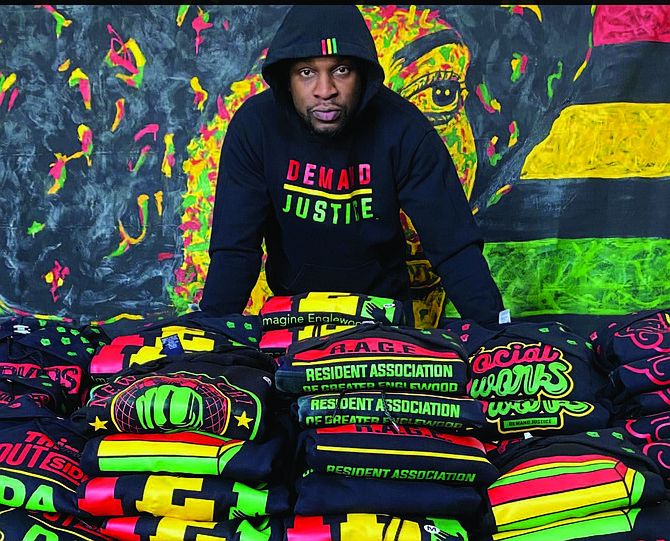ARTIST RAISES MONEY THROUGH HOODIE COLLABORATION
Maxwell Emcays, local artist, collaborated with 26 Black-led organizations on a hoodie project where a portion of the proceeds from the sale of the hoodies went to those organizations. The project was an expansion of Emcay’s Demand Justice project.
Local artist, Maxwell Emcays, created Demand Justice as an art activism project. In February, he collaborated with 26 organizations throughout the city of Chicago to create hoodies. The sale of the hoodies resulted in raising $10,000 for those organizations.
“I, personally, as an artist, have always looked at clothing as another place of expression. And, essentially, I was bridging together those ideas, the fact that I’m always open to and working with other organizations and amplifying their voice and showcasing what they demand justice for,” Emcays said.
Emcays hopes the sale of the hoodies will result in organizational unity. He said the hoodies are in recognition of 17-year-old Trayvon Martin, who would have been 26-years-old this past February. George Zimmerman was acquitted of all charges in Florida v. George Zimmerman in the shooting death of Martin, who was wearing a hoodie when he was killed.
“I wanted to make it strictly hoodies to speak on that particular statement, as well as the criminalization of that particular apparel and other apparels worn by Black males that are demonized and criminalized,” he said.
Emcays said he was inspired by various types of art and created Demand Justice as a form of street art. He said he particularly likes Shepard Fairey, who is known for the Barack Obama “Hope” poster and the Nelson Mandela Mural in Johannesburg.
Emcays added, he loves how street art is propaganda and expression. And, how it doesn’t ask for permission nor forgiveness. “Street art is about reclaiming and taking back control of your messaging and your identity,” he said. He added, the Demand Justice signs fit somewhere in between street art and a general beautification project. “It’s like a rogue vigilante street art project where there’s many signs all throughout the city,” he said.
Emcays said he hopes those signs serve as a way to uplift and inspire others. The signs are on the South, North and West sides of the city, he said. It’s an open-ended statement that is meant for someone to fill in the blank, he continued. “I always wanted to allow whoever to fill in the blank. I never wanted to take ownership of what Demand Justice meant. I wanted it to mean whatever it needs to mean for who it needs to mean something for,” he said.
“So, these hoodies were an opportunity to make Demand Justice to mean a bunch of different things to a bunch of different things to different individuals, and particularly organizations. That was a key component. All of these organizations demand justice for something in their own unique way.” Those organizations include: Good Kids Mad City, Gray Matter, Boyz to Men, Imagine Englewood If …, Resident Association of Greater Englewood (R.A.G.E.), Sip & Savor, Social Works and Think Outside da Block.
Emcays said he chose the organizations because they reflect young Black-led organizations that are getting things done. “All of the organizations are mid-tier and doing the work. And, are reflective of having a similar energy and thought process,” he said. “It’s bringing together all of these organizations in a unique way. They’re all leading in their own way. I feel like that is the ultimate defense to the destruction of the movement and ideas that we pursue.”
Emcays said each organization gets a percentage of every sale, which allows organizations to use it as a fundraiser. He didn’t want it to be a charity situation, but to have a product on the market people can support by purchasing it.
“Hey, this is a product that is a byproduct of these organizations and the work they do, do you want to partake. I think the response shows that’s a very viable alternative. And, it also circumvents all the other influential money, that could be coming,” he said. “This is all by the people, this is not through various controlled grants or funding. This is the people supporting the people. And, I think those particular models are very, very important.”
For more information on Demand Justice, visit demandjusticechicago.org.
Latest Stories
- Legacy Speaks: Mapping Ida B. Wells' Imprint – A Tribute to Ida B. Wells on Her Birthday
- Cook County Commissioner Donna Miller Launches Congressional Campaign
- Community’s Voice Shapes Future Leadership
- Chicago Board of Education Approves Resolution Launching Healthy Green Schools Pilot Program
- CVS Health opens new Workforce Innovation and Talent Center in Chicago
Latest Podcast
STARR Community Services International, Inc.

